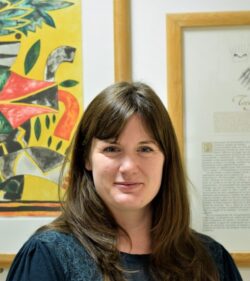Dr Cara Levey

Colleagues will be sorry to learn of the death, on 11 September 2024, of Dr Cara Levey, former Teaching Fellow in Latin American Studies in the School of Languages, Cultures and Societies. The following tribute has been contributed by friend and colleague, Professor Thea Pitman.
Cara studied for a BA in Spanish Language and Literature in the School of Modern Languages and Cultures (now the School of Languages, Cultures and Societies) at Leeds, graduating with a first-class degree in Summer 2005. After pursuing a Master’s degree at the University of London, she returned to Leeds to study for a PhD in the field of Latin American studies, supported by an AHRC studentship. She successfully defended her thesis, entitled Struggles for memory, struggles for justice: the role of commemorative sites in post-transitional Buenos Aires and Montevideo, in late 2010. From the later stages of her period of doctoral study until early 2013 when she secured permanent employment in the Department of Spanish, Portuguese and Latin American Studies at University College Cork, Cara worked as a teaching fellow in Latin American studies within the School of Languages, Cultures and Societies.
Colleagues who knew Cara both as a student and a colleague remember her most fondly. As an intellectual, she was almost a ‘born academic’ – she was already confidently giving papers at research events while still an undergraduate and she initiated innovative interdisciplinary research in the intersecting fields of memory studies, social justice and human rights while undertaking her PhD. One of her supervisors for her PhD, Emeritus Professor Paul Garner, writes that, ‘Cara was such a joy to work with, very bright, very hard working, and destined for a very successful career, which she went on to establish at UC Cork. She was very popular with staff and students at Leeds and we all thought very highly of her. Her thesis was a very original contribution to the study of migration and exile in the Southern Cone.’
As a teacher, she was very highly regarded – her specialist module on human rights in Latin America was always over-subscribed or else we had to open a second group to satisfy student demand. As Professor Richard Cleminson, observes, ‘I will remember Cara in so many ways: not only was she a great intellectual who pioneered a new area of studies, she cared about students and was genuinely supportive of her colleagues.’ In terms of her relationship with colleagues, she is also remembered as being ‘enthusiastic and brilliant’, ‘charismatic, and bright, and truly joyful company’, ‘cheerful, empathetic and affectionate’, and ‘vivid and so much craic’. Most notably, Professor Helen Finch credits her with having been pivotal in the development of her own career: ‘Together with other colleagues, we set up an interdisciplinary Memory, Trauma and Violence cluster in the School of Languages, Cultures and Societies. Her intellectual energy and vision were invaluable in running a fantastic inaugural Memory, Violence and Trauma Workshop together in January 2013, shortly before she left for Cork. In many ways, this cluster and this workshop were formative for my subsequent research in memory and Holocaust studies. I am forever grateful to Cara for her intellectual collegiality and wonderful networking ability.’ Even those who started at Leeds after Cara had left, such as Dr Rebecca Jarman, remember being told on many an occasion of ‘the wonderful rapport that she had with students’ that they would need to measure up to.
Colleagues also remember Cara’s sense of fun, her love of the beautiful game, of capybaras and of Argentine actor Ricardo Darín. Those of us who had the pleasure of visiting her in Cork also remember her warm hospitality, and of seeing how radiantly happy she was in her new home, with husband Teddy and, in the course of time, her children, Odhran and Ruairidh. As Professor Stephanie Dennison has remarked, ‘What really stands out for me was how she took the big move to Cork in her stride and seemed to be thriving, professionally and personally. Her future looked so incredibly bright. Cara also had a real gift of the gab, so despite moving to Cork she didn’t need to kiss the Blarney Stone. She was really easy, fun company.’ We also know how proud Cara was of her recent acquisition of Irish citizenship.
For many others, contact with Cara after she left Leeds was mainly through social media. Here she was in her element. Professor Dennison observes that, ‘Cara had social media banter down to a tee but was also great at reporting on social injustices, whether in South America, Ireland or the UK. She was also really supportive of others' research, sending encouraging comments to those brave enough to share their work on social media.’ Professor Finch also notes that, ‘I missed Cara terribly when she moved to UCC, but we kept in contact on Facebook. Cara always provided online support and humorous commentary on our shared joys and stresses of parenting tiny children while pursuing an academic career through the rigours of Brexit and the pandemic.’
We are still struggling to fathom the fact that Cara is no longer with us, even via social media. We extend our deepest condolences to Cara’s family and colleagues at University College Cork and we will seek fitting ways to fully honour Cara’s time here at the University of Leeds in due course.
